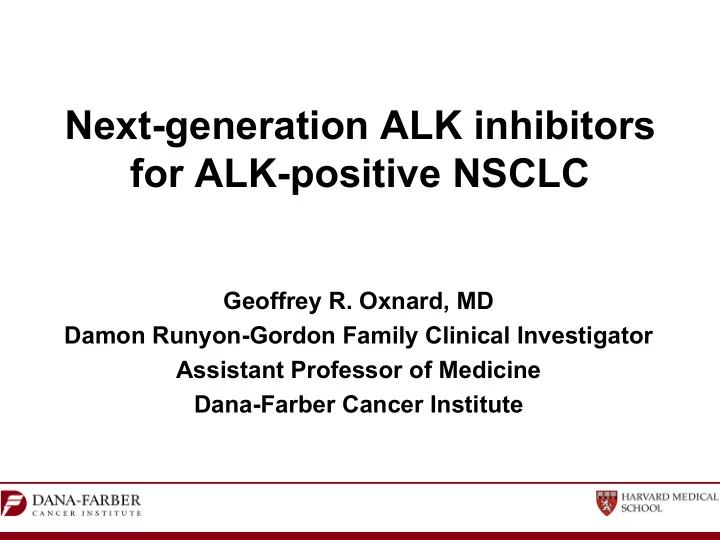

Next-generation ALK inhibitors for ALK-positive NSCLC Geoffrey R. Oxnard, MD Damon Runyon-Gordon Family Clinical Investigator Assistant Professor of Medicine Dana-Farber Cancer Institute
Case • A 60-year-old never smoker presents with NSCLC metastatic to brain – First presented a year ago after resection of cerebellar mass showing adenocarcinoma – Received SRS to surgical bed and 2 nd site – ALK FISH+, initiated crizotinib, well tolerated with systemic response – He is divorced, lives with one of his two children, works full time and travels a lot
Case • A 60-year-old never smoker with ALK+ NSCLC on crizotinib – Brain MRI after 8 months shows progression
Case • A 60-year-old never smoker with ALK+ NSCLC and CNS progression on crizotinib – What would you recommend? • Started ceritinib 750 mg QD – Stable brain mets, complained of GI toxicity • Switched to alectinib 600 mg BID – Stable brain mets for 2 years
Next-generation ALK inhibitors for ALK-positive NSCLC Geoffrey R. Oxnard, MD Damon Runyon-Gordon Family Clinical Investigator Assistant Professor of Medicine Dana-Farber Cancer Institute
Second-generation ALK TKI • Ceritinib and alectinib both FDA approved after failure of crizotinib – 39%-50% ORR, 5-9 mo median PFS, CNS activity Ceritinib: Alectinib: 39% ORR 45%-50% ORR 5-mo median PFS 8-9 mo median PFS Crino et al. JCO 2016; Shaw et al. Lancet Oncol 2016; Ou et al. JCO 2016.
Second-generation ALK TKI • Alectinib has generally been better tolerated than ceritinib – Ceritinib phase II trial reported 46% incidence of grade 3-4 drug-related AE (LFT, N/V, diarrhea), with dose reduction in 54% of patients – Alectinib phase II trials reported low incidence of grade 3-4 drug-related AE, with dose reduction in 16%-20% of patients • Alternate ceritinib dosing (with light snack) is being studied and is better tolerated Crino et al. JCO 2016; Shaw et al. Lancet Oncol 2016; Ou et al. JCO 2016.
ALK resistance • Emerging data suggests that newer ALK inhibitors alter the spectrum of resistance mutations, inducing more ALK resistance mutations Gainor et al. Cancer Disc 2016.
Response to Brigatinib in ALK+ NSCLC ORR All patients (n = 79): 75% Previous crizotinib (n = 71): 72% Crizotinib naïve (n = 8): 100% Gettinger SN et al. Lancet Oncol 2016;17(12):1683-96.
Brigatinib • Broad activity against a range of resistance mutations • ALTA trial randomized 222 patients with NSCLC with crizotinib resistance to two different doses: ORR Median PFS PFS HR 100 90 mg qd 45% 9.2 months 0.55 90 (0.35–0.86) 90 mg à 180 mg qd 54 % 12.9 months 80 P r o b a b ilit y o f P F S (% ) 70 60 50 40 30 9 0 m g q d 20 1 8 0 m g q d * 10 0 0 6 12 18 24 T im e (m o ) Gettinger et al. Lancet Oncol 2016; Kim et al. ASCO 2016; Zhang et al. CCR 2016.
ALTA: Select Adverse Events Any grade AE Brigatinib 90 mg qd Brigatinib 180 mg qd (≥10% of patients) (n=109) (n=110) Nausea 33% 40% Diarrhea 19% 38% Cough 18% 34% Dyspnea 21% 21% Hypertension 11% 21% A subset of pulmonary AEs with early onset (including dyspnea, hypoxia, cough, pneumonia, pneumonitis) occurred in 14 (6%) of patients, before dose escalation to 180 mg Kim D et al. ASCO 2016;17:Abstract 9007.
Phase I study of Lorlatinib in ALK+ NSCLC Lorlatinib demonstrated robust clinical activity in patients with ALK+ and patients with ROS1+ NSCLC, most of whom had brain metastases and had received ≥ 1 prior ALK TKI Solomon BJ et al. Proc ASCO 2016;Abstract 9009.
Phase I/II Trial of Ensartinib (X-396) in ALK+ NSCLC All patients Crizotinib Response (n=27) treated (n=12) Partial response 19 (70%) 10 (83%) Stable disease 2 (7%) 1 (8%) Most adverse events were grade 1/2 and included rash, nausea, vomiting and fatigue Lovly CM et al. Proc AACR 2016;Abstract CT088.
Lots of ALK inhibitors Crizotinib Ceritinib Alectinib Brigatinib ALK+ ALK ALK (Not yet Indication NSCLC resistance resistance approved) Highly active Yes Yes Yes Yes Tolerability Good Moderate Good Good CNS activity Some Good Good Good Potency against Poor Moderate Moderate Good resistance • Potent CNS activity of newer ALK inhibitors, combined with favorable toxicity profile, means that patients can stay on therapy for a durable period • Moving potent ALK inhibitors into first line to prevent resistance is intuitive Kwak et al. NEJM 2010; Awad et al. Clin Adv Hematol Oncol 2014; Kodama et al. MCT 2014; Solomon et al. JCO 2016.
Summary • Current standard approach for ALK+ NSCLC: Second-line First-line Third-line alectinib or crizotinib platinum/pem ceritinib • Future approach envisioned for ALK+ NSCLC? First-line Second-line Third-line alectinib or brigatinib? ??? ceritinib?
Recommend
More recommend